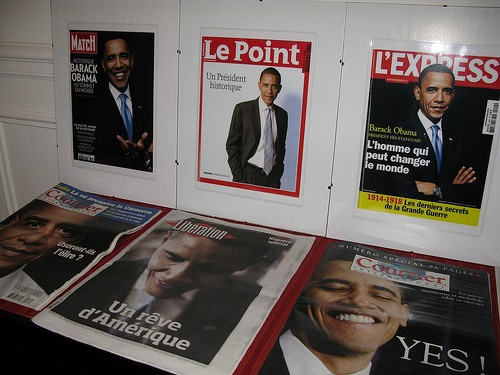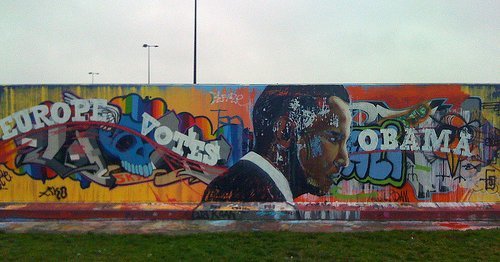The eastern EU enlargement, the redefinition of EU-Russia relations and the re-assessment of the EU role in the era of globalization come forward as some of the external consequences.
Additionally, the dominance of Western norms in the political, economic and organizational logic of 21st century societies, strongly affected European internal politics and policies. The weakening of communist parties, the shift of socialist parties towards more liberal policies and the cessation of the 80’s strong ideological conflicts around Europe, appear as some of the internal consequences.
What becomes evident, therefore, is the comparatively weak role that alternative ideologies play, nowadays. However, if ideologies and their interaction are not anymore the prominent factor that shapes politics, then what is it? Which factor could play a major role in changing European politics and consequently also European societies? What can bring change in Europe and a sense of euphoria and enthusiasm after the institutional failure of the Lisbon Treaty and the serious economic crisis that is taking place?
The answer comes from the other side of the Atlantic…
Recently, a new phenomenon has spread in American politics. However, it would be really misleading to limit the existence of this phenomenon within the US borders. Its importance was so clear that the huge majority of the media and citizens put aside for a significant period the most serious economic crisis of the post-Second World War era. For those who are still wondering the name of this phenomenon, it is indeed called Barack Obama.
Senator Obama is, probably, these days the most popular man on earth, especially in the Western hemisphere. Someone could additionally argue that he is also the most popular man in the European continent. Nevertheless, what is the meaning of his popularity and why has a US presidential candidate managed to be that well-appreciated in Europe?
Concerning popularity, the ‘WordNet’ online dictionary by Princeton University defines it as the quality of being widely admired or accepted or sought after. What appears to us of great interest is the last part of the definition, namely sought after half.
What is the reason that makes Europeans seek after a person like Obama?
Firstly, it can not be because of his policies, since he has not yet had the chance to formally act as President.
Secondly, we do not believe that Europeans saw their daily life greatly changed since Obama became President of the United States.
The reson must be then linked to what people expect and hope that Obama will do. It is what they imagine that he can do, as he constantly declared ‘We can change’. Such a motto, in fact, was happily welcome in Europe.
It has than to do with Europe’s need for changes and innovations: since these did not come from inside Europe, namely the EU and its institutions, they shall come from the outside.
The causes of this situation find their roots in the political stance of the current European leaders.
French President Mr. Sarkozy could become a leader for Europe. However, the current reality is, to use a euphemism, disappointing, since the greatest achievement of his Presidency has been his romance with Mrs. Bruni.
Another possible European leader could be German Chancellor Mrs. Merkel. Though, her expressed views about Europe and its future are not truly innovative while her actions inside the EU institutions remain in the spectrum of German domestic interests.
Lastly, while British Prime Minister, Mr. Brown, could claim the title of European leader, his dependence on British politics in order to be re-elected and the problems that he is currently facing at the domestic level support the view that he cannot become one.

Therefore, if someone wonders why the figure of Obama - and not of any European leader - is to be found on the front pages of Le Figaro, Bild and the London Times, he should look at the European states’ domestic politics and at the views and actions of their leaders. These leaders who, contrary to Obama, have not managed to go beyond the borders of their own parties and political groups and cut across all political and class divisions. Unfortunately for them, hope and trust, efficiency and effectiveness, innovation and progress are not a matter of ideology.
European citizens want change in Europe,
Obama’s example shows that European citizens want change in Europe, as well. And, by change, they do not mean little alterations. The Lisbon Treaty was an example of, mostly, institutional alterations and it failed. It failed because European citizens were not informed about its content. And they were not informed about its content due to the fact that they were not interested in getting informed. They knew that the changes foreseen in it could not change their lives were not the answer to the problems they were facing. Their views werw not finding a channel for beiing properly represented via the Treaty. It was the proof that the whole structure of the EU is all but a Europe of the citizens.
Concluding, the current structure of the EU lacks two, extremely, important characteristics. Initially, the possibility of an emergent personality of pan-European acceptance that could provide the confidence that European citizens have lost regarding politics. Secondly, representativeness of the views and opinions of its own citizens.
While the most innovative political effort since its birth, 21st century Europe is in danger of getting old-fashioned and of causing the apathy of its own citizens. And to avoid it, a strong injection seems necessary...


1. On 30 November 2008 at 20:49, by Rene Wadlow Replying to: The Obama ’phenomenon’ and the lessons for Europe
Replying to: The Obama ’phenomenon’ and the lessons for Europe
In a useful recent article the Israeli peace advocate Uri Avnery looks at what an Israeli Obama might be - a parallel with what an European Obama might be: Best wishes, Rene Wadlow
Uri Avnery 29.11.08
Barak Ovadya, Candidate
THE ISRAELI OBAMA. What will he look like, the Israeli counterpart of Barack Obama? What will be his attributes?
That is a tantalizing question. It goes without saying that one cannot construct a human being according to a recipe, like a cake from a cook book. But one can, at least, consider a few of the desired traits.
For example:
- WHERE WILL HE COME FROM?
The Israeli equivalent of the black community in the United States is the Oriental Jewish community, the Jews who have come to Israel from Arab and other Islamic countries. They do not belong to another people, like the Arab citizens of Israel, they belong to the majority population. They are a patriotic community which sees itself discriminated against, a community of second class citizens.
In order to obtain an exact parallel to Obama, the candidate should be half Oriental and half Ashkenazi, with the Oriental part of his image dominating. Once I invented a Hebrew word for Israelis of mixed Ashkenazi-Sephardi origin – “Ashkeradim”. The term did not catch on, in spite of the fact that we now have hundreds of thousands of women and men who fit this definition.
So, the Israeli Obama is an Oriental Jew of mixed extraction.
For convenience’s sake, let’s give him an imaginary Hebrew name: Barak Hasson Ovadya.
– WHAT WILL BE HIS TASK?
The first achievement of Barack Obama was the mobilization of millions of voters, many of them young, who were fed up with the politicians. He inspired them, gave them a reason to join the political process and turned them into activists, donors and mobilizers.
He proved a hugely important thing: what this large group detested was not politics, as it seemed, but the politicians. They had come to the conclusion that there was no real difference between the members of the various parties, that they were all cynics, all greedy for power and most of them greedy for money. When these young voters saw a politician of a different species, they hoisted him onto their shoulders.
That is exactly what we need. The recent experience in the Tel-Aviv municipal elections proves that this is possible. When a politician of a different kind appears on the stage, one who does not resemble the old-time politicians, the voters will recognize him.
The Israelis are a political people, perhaps more so than any other. But they are tired of the politicians they know. They see that there is no real difference between the leaders of the three major parties, between the incumbent Prime Minister and the three candidates scrabbling to succeed him. They believe “they are all the same,” and that the leaders of the small parties are not very different either. They see no difference in their character, no real differences between their messages. These potential voters don’t vote at all, or they vote, out of sheer spite, for some half- farcical list, like the Pensioners’ Party in the last elections.
“Barak Ovadya” must find his way into the hearts and minds of these hundreds of thousands. He must give them hope and motivation, convince them that it is possible to change everything completely, and thus inspire them to join the campaign for a renewal of the political scene in Israel.
– WHERE WILL HIS VOTERS COME FROM?
The second great achievement of Barack Obama was his success in constructing a new rainbow coalition: young whites and blacks, Hispanics, Green idealists, liberals, people with a social conscience, gays and lesbians, and at the end also feminists.
The ability to build such a coalition is essential for Barak Ovadya. Israel does not need another small party representing a one-issue crowd. That is the job of extra-parliamentary advocacy groups, each of which acts in a niche of its own and concentrates on one issue. A political party designed to change the political system and set the country on a new course must form a majority around a message that touches all spheres of life of the state and the citizen.
In Israel, this is harder than in the United States. The American two-party system encourages large conglomerates. Our system of proportional representation, on the other hand, encourages the very opposite – small one-issue parties.
In order to launch the big change there is a need for a strong political camp. Ovadya will have the task of building a grand coalition before the elections. That is in essence the founding of a new party – or the taking over and total re-shaping of an existing party, as Obama has done.
What will be the ingredients of such a new force? The masses of young Ashkenazis and Orientals, the “social” public, the Arab citizens, the Russian community, the greens, the secular, the gays and lesbians, the feminists, the religious progressives, and of course the peace activists.
Even Hercules would think twice before undertaking such a task. For reasons we don’t have room to go into here, an abyss is yawning between those who are striving for peace and reconciliation with the Palestinian people, almost all of whom belong to the Ashkenazi elite, and the Oriental Jews, the great majority of whom vote for the old right-wing parties, in glaring contradiction to their own economic interests. The Russian public is cut off, estranged and bitter. It lives in a soap bubble, and almost all of its spokespersons are extreme nationalist racists. The large secular public, which loathes the domineering religious establishment and the extreme-right message of almost all of its spokespersons, has no one to vote for. Even Meretz has lowered this flag to half-mast. (In the recent municipal elections in Jerusalem, the secular voted, for lack of an alternative, for a secular right-winger.)
Can all these messages, which look so different, be connected to each other? The fight against corruption and the concern for the environment, the struggle for a just peace and the longing for social justice, the demand for equality for the Arab citizens and the citizens of Russian origin (both Jews and non-Jews), equality for women and for gays and Lesbians, the demand for the separation of State and religion, and the insistence on human rights, a healthy Israeli patriotism and universal human values?
The answer is: yes, absolutely! All these aims spring from the same source: the striving for justice, for a model society, for a country that is good to live in, a state we can be proud of.
Is this possible? Some people believe that if one just utters the word “Palestinians”, all the other voters will run away. Or that the Oriental heritage of the candidate will scare away the members of the Ashkenazi elite. Or that the Russians will be deterred by the Arabs.
I am convinced that it is indeed possible – provided that the overall message is convincing enough, that it is balanced and emphasizes the uniting and not the dividing, that each of the aims finds the place it deserves in the general scheme, that it is clear that one thing depends on the other. (In 1965, such an effort was made by the founders of the “Haolam Hazeh – New Force Movement”, which succeeded in breaking into the Knesset, a feat considered impossible until then. But the time was not yet ripe, and the effort petered out.)
The connection between the various aims is not mechanical. They must form parts of one great, captivating message. A patriotic, humanist message that addresses the heart and the mind at the same time. Obama did this in America. Ovadya must do it in Israel.
– WHAT ATTRIBUTES DOES HE NEED?
Obama has a rare combination of traits, making him an almost perfect candidate.
He is new. He is untouched by corruption. He is a great speaker, convincing in every word. He never makes a gaffe, not even under heavy pressure. His views are considered and balanced. He does not get excited. His private life seems without flaw. He radiates tranquility. He lives modestly. He showed personal and moral courage when he opposed the Iraq war from the first moment. (How many people in Israel opposed the first and second Lebanon Wars from the first day?) His message unites, it does not divide. He doesn’t revel in controversy. He has no “killer instinct”. He brought with him a message of hope, an altogether positive message, a message that allows him to find his way even into the hearts of his opponents.
And on top of everything else – and that must not be underestimated – he is good-looking.
Such people do not grow on trees. But such an almost impossible combination of characteristics is essential for a task that looks almost impossible. Mahatma Gandhi was like that. And perhaps Jesus. And Rabbi Hillel (“the Old”). And perhaps Henri IV, king of France. But in their day there was no TV.
SUCH A THING can happen suddenly, without prior notice, and conquer a nation in one stroke. But the chances for it to happen this time, with just 42 days to go before the elections, are slim indeed.
The way things look now, the next Knesset will be as miserable as the present one. It will not be able to tackle any of the big national and social problems. It will collapse long before it is threatened by old age.
The great effort of preparing the ground for a powerful new political camp must start on the morrow of the elections.
Barak Hasson Ovadya, where are you?
2. On 5 December 2008 at 01:11, by Dimitris Mathioudakis Replying to: The Obama ’phenomenon’ and the lessons for Europe
Replying to: The Obama ’phenomenon’ and the lessons for Europe
An, indeed, useful contribution with a lot of imaginary thought. Initially, I would like to agree with the assumption that ’one cannot construct a human being according to a recipe, like a cake from a cook book’. Though, what is, at least to me, indisputable is the ability of a society and its political system to limit significant types of candidates and promote others. For example, we can look at the armenian minority in Turkey (in terms of nation) or women in the majority of the Islamic world (in terms of sex). The US political system had the privilege, due to its democratic maturity, of having broken these walls that had to do with notions like skin colour, sexual preferences, religion and every other kind of discrimination. It is essential to repeat once again that what is under discussion here is the capacity of the political system and not of certain parts of the American society. Conservative ideas and people that represent them do and will, always, exist. What is of significant value, though, is the possibility that our democratic system of government gives, to overcome these ideas if they don’t express the majority of our societies. In other words, if we want an Israeli or European Obama, we should shape the conditions (polity and society) under which he will emerge...
Follow the comments: |
|
